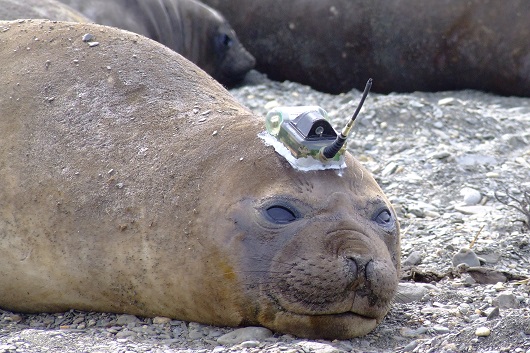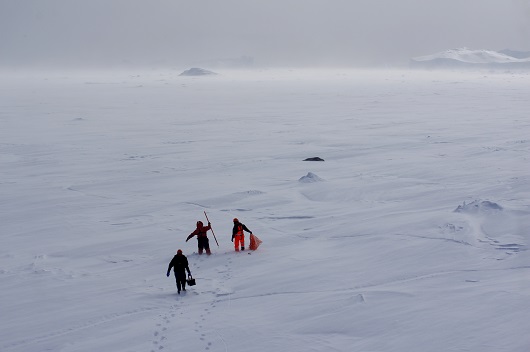Climate data gets seal of approval

Seals have helped gather information on some of the harshest environments on the planet, using technology designed by scientists at the University of St Andrews.
The resulting data – gathered from remote, icy seas over the last decade – will be made freely available to scientists around the world as part of a new data portal launched today (Monday 1 June 2015).
The MEOP (Marine Mammals Exploring the Oceans Pole-to-pole) portal offers – for the first time – data on parts of the planet virtually inaccessible to man. By tapping into the natural habitat of seals, such as ice-bound polar regions, researchers have been able to build up a detailed picture of those areas currently very difficult for humans to visit and monitor.
Thanks to sensors designed and made at the Sea Mammal Research Unit at the University of St Andrews, teams of experts around the globe have been able to collect information on the conditions of the world’s most remote oceans.
Since 2004, a small army of seals equipped with the sensors has produced nearly 400,000 environmental profiles, resulting in one of the world’s largest oceanographic database for polar oceans.
Mike Fedak, a Professor of Biology at the University of St Andrews, said, “The fact that animals have collected the data is an interesting innovation in ocean observation. But perhaps of more general importance is that data from these remote and inaccessible places now gives us a much clearer picture of the state of the world’s oceans. We have since shown that data from these far-flung locations is critical to understanding the broader state of the Global Ocean.”

The sensors – or ‘tags’ – are non-invasive (they fall off when the animal moults) and the only devices of their kind that can be attached to animals.
The tags sent information periodically back to researchers in short messages via satellites. Dr Lars Boehme, a Lecturer at the University of St Andrews, explained, “The information sent back to us gives us details about the seal’s immediate physical environment. It’s like tweeting.”
Data was decoded and processed back in St Andrews, before being shared with the consortium. Information was also relayed to the Met office and similar bodies across the world for use in weather forecasting.
Scientists around the globe – including St Andrews in Scotland and the British Antarctic Survey – did their own individual research using the data, before making it available for other scientists and climate researchers to use via the new portal.
The St-Andrews technology forms part of a global ocean observing system – including satellites – that diving marine animals such as seals are forming an essential component of.
Dr Boehme continued, “Changes in the polar oceans have global ramifications and a significant influence on weather and climate. Sustained observations are required to detect, interpret and respond to change and a strategic system of observations combining a range of platforms is critical in maintaining the flow of information.
“The new portal will make available all the data collected by animals up to now to the wider international scientific community and will import future animal platform data as well. This development is particularly timely as an increasing number of studies now focus on the importance of data from these remote and inaccessible parts of the sea.”
MEOP contains data from a ten-year project involving an international consortium of participants from eleven countries: Australia, Brazil, Canada, China, France, Germany, Greenland, Norway, South Africa, United States and the United Kingdom.
ENDS
Notes to picture editors:
IMAGES OF SEALS AND THE POLAR REGIONS COVERED ARE AVAILABLE FROM THE PRESS OFFICE – CONTACTS BELOW.
Notes to news editors:
THE RESEARCHERS ARE AVAILABLE FOR INTERVIEW:
PROFESSOR MIKE FEDAK: 01334 463218 OR EMAIL [email protected]
DR LARS BOEHME: 01334 462677 [email protected]
What the portal will provide:
On June 1, 2015, national oceanographic data centres and researchers will be able to access data collected by marine animals via the MEOP (Marine Mammals Exploring the Oceans Pole-to-pole) Portal (www.meop.net). The MEOP international consortium formed during the International Polar Year in 2008-2009, with participants from eleven countries (Australia, Brazil, Canada, China, France, Germany, Greenland, Norway, South Africa, United States, United Kingdom). Data provided by MEOP consists of vertical temperature and salinity profiles collected with the help of marine animals that travel throughout the World’s oceans, and especially within the polar oceans where there is a real observational data deficit. The data will be freely available through the MEOP Portal and, critically for its general usefulness, will have been processed to consistent quality standards so that the data may be seamlessly incorporated into oceanographic models.
Why is the appearance of the MEOP Portal particularly timely? An increasing number of studies now show the importance of these remote and inaccessible parts of the ocean which are so difficult to observe. For example, more than 90% of extra heat in the Earth system is now stored in the oceans and the Southern Ocean in particular is a key site for understanding the uptake of heat and carbon. MEOP provides several thousand oceanographic profiles from the Southern Ocean per year helping us to close any gaps in our understanding of the climate system. Recent published work also has shown how important such observations are in predicting ice cover and mixed layer depth in large tracks of ocean far removed from where the observations were made.
The single greatest source of uncertainty in models predicting changes in sea level is the stability of major ice sheets in West Antarctica and Greenland, and animals have provided critical data on ocean heat content and flow in both regions. So making the rapidly growing data sets collected by animals widely available to oceanographers and modellers is vital.
Issued by the University of St Andrews Communications Office, contactable on 01334 462530 or [email protected].
Category Research